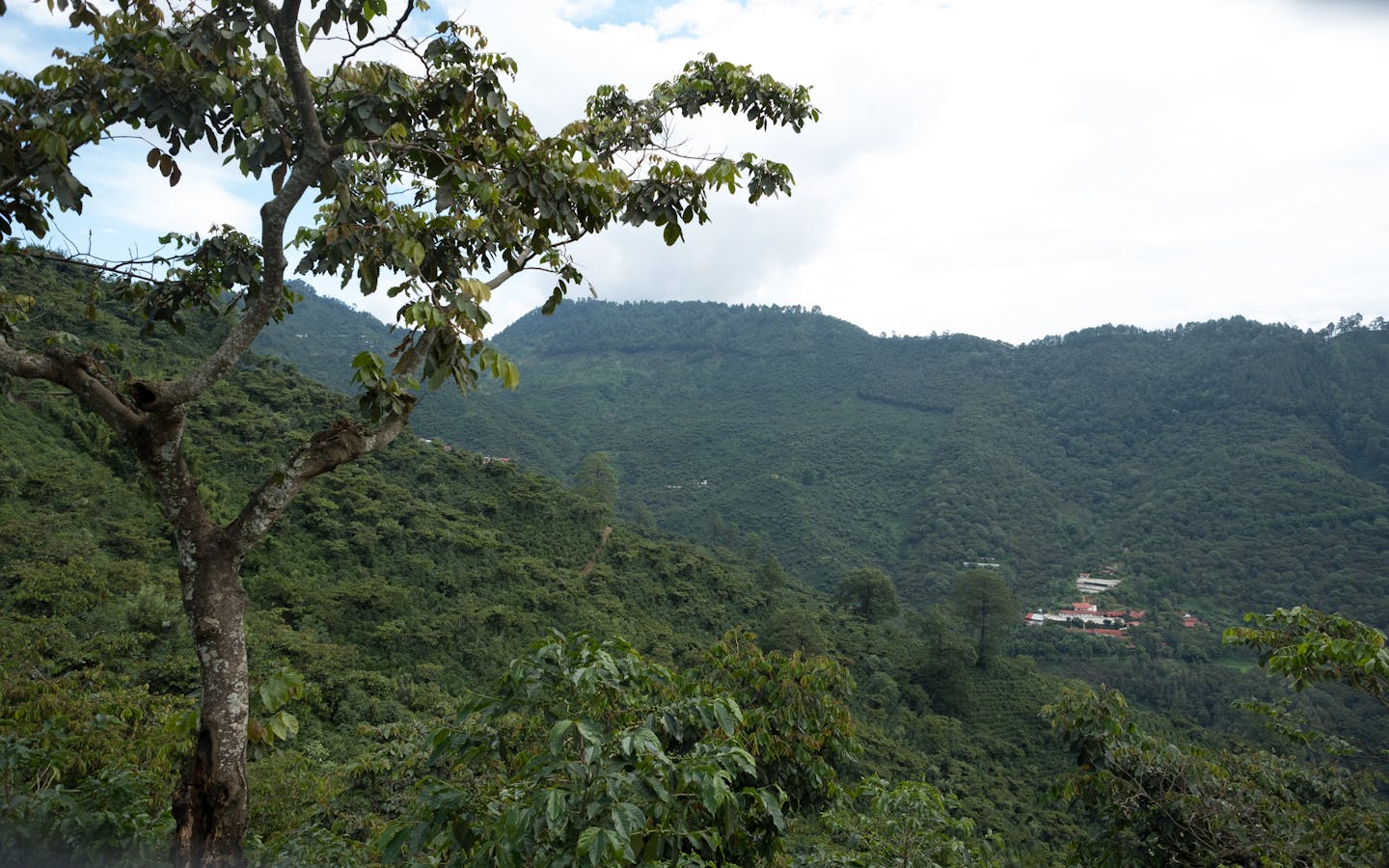Together, we have created a new way to produce coffee: one that is sustainable, transparent, and good for people and the planet.
And who benefits? Partners like the Gitesi coffee farm (left) in Rwanda, a farm run by — and for — women. Gitesi is one of thousands of farms verified by Starbucks C.A.F.E. Practices for its sustainable farming practices.
But there is always more to do. Starbucks is committed to 100% ethically sourced coffee, and Conservation International is a proud partner in this effort.
Our role
Stemming from the work at origin with coffee farmers — by introducing communities to the emerging forest carbon market, to creating farmer loans, to the C.A.F.E. Practices program — Conservation International and Starbucks continue to innovate within the coffee sector. Together, we are sparking an industry-wide movement to make coffee the first sustainable agricultural product in the world.
By the numbers
Over 460,000 coffee farms on 4 continents are supporting transparent, profitable and sustainable coffee growing practices while also protecting the well-being of coffee farmers and workers their families and their communities through C.A.F.E. Practices.
Find out more at the 2017 - 2021 C.A.F.E Practices Impact Assessment Report

Assessing Impact
This impact assessment — covering 2017 through 2021 — enables better understanding of how C.A.F.E Practices performance is changing from year to year.
Programs
Conservation International and Starbucks are working together to support the people and rich ecosystems of coffee growing regions.

Ethical coffee sourcing practices
Conservation International and Starbucks joined forces to develop buying guidelines for ethical coffee sourcing.
C.A.F.E. Practices guidelines help farmers grow coffee in a way that's better for both people and the planet. Through ongoing monitoring and evaluation of our joint initiatives we are able to measure program performance, identify new challenges and opportunities and determine how best to expand our support for global coffee growing communities.

The Sustainable Coffee Challenge
Conceived by Conservation International and Starbucks and launched during the 2015 Paris climate meetings with 18 founding partners dedicated to coffee sustainability, the Sustainable Coffee Challenge has since grown to over 160 partners from across the coffee sector.
The Sustainable Coffee Challenge convenes, unites and urges the coffee sector and conservation partners across the industry to spur the actions and investments necessary to make coffee the first sustainable agricultural product in the world. The Challenge is committed to stimulating demand for sustainable coffee across the value chain, from the policymaking level to the final consumer. By encouraging demand for sustainable coffee, it leads to investments that enable the transition to a sustainable production and ensuring the coffee we drink is a sustainable product.

100 million trees commitment
In April 2017, Starbucks announced that it will ensure that 100 million healthy coffee trees get into the hands of coffee farmers that need them by 2025.
This effort is part of the company’s ongoing commitment to provide comprehensive support to farmers around the world. Providing healthy trees to farmers in coffee-growing regions makes existing farmlands more productive and keeps us from expanding into forests.
It also contributes to the industry wide goal announced by The Sustainable Coffee Challenge to replant 1 billion coffee trees, to ensure positive outcomes for farmers, the industry and the environment.
This Starbucks 100 million trees commitment builds on the successful One Tree for Every Bag campaign (September 2015 through June 2017) launched to help farmers whose crops were affected by coffee rust, a plant fungus that has damaged millions of trees around the world.
Through this campaign, Starbucks contributed to Conservation International for every bag of coffee sold at participating stores in the U.S. Conservation International in turn made grants to seedling nurseries that provided new rust-resistant coffee trees directly to farmers in El Salvador, Guatemala and Mexico.
Follow Starbucks’ Journey to 100% Ethically Sourced Coffee
Featured publications
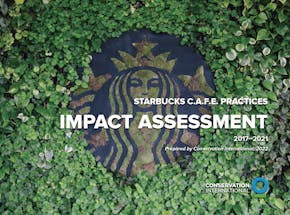
CI 2022 Impact Assessment Report
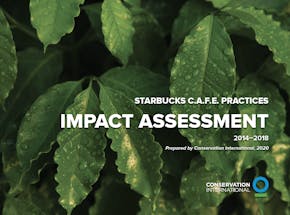
Starbucks C.A.F.E. Practices Impact Assessment 2014 — 2018
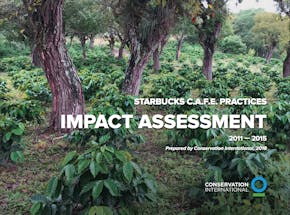
Starbucks C.A.F.E. Practices Impact Assessment 2011 — 2015
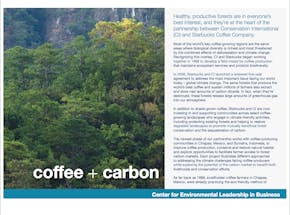
Coffee + Carbon Fact Sheet
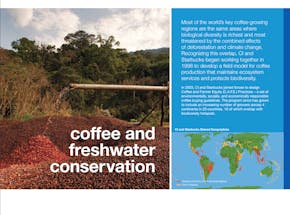
Coffee + Freshwater Fact Sheet
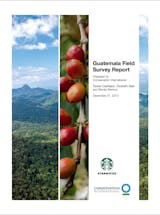
Guatemala Field Survey Report
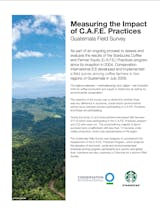
Measuring the Impact of C.A.F.E. Practices - Guatemala Field Survey
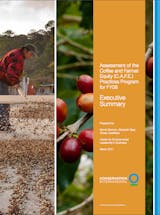
Assessment of the C.A.F.E. Practices Program for FY08 - Executive Summary
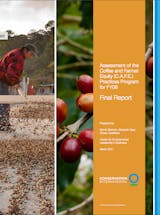
Assessment of the C.A.F.E. Practices Program for FY08 - Final Report
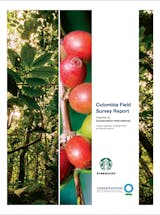
Colombia Field Survey Report
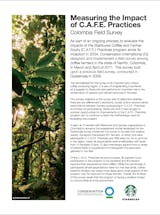
Measuring the Impact of C.A.F.E. Practices - Colombia Field Survey
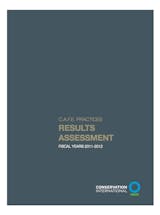
C.A.F.E. Practices Results Assessment: Fiscal Years 2011-2012
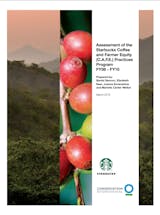
Assessment of the Starbucks C.A.F.E. Practices Program - FY08-10
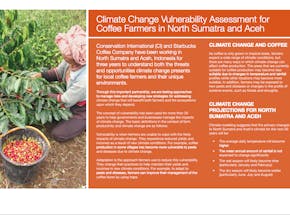
Climate Change Vulnerability Assessment for Coffee Farmers in North Sumatra and Aceh
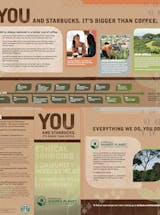
Starbucks Global Responsibility
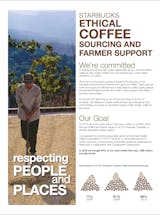
2010 Starbucks Ethical Coffee Sourcing and Farmer Support
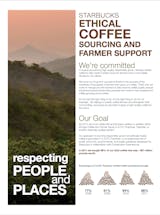
2011 Ethical Coffee Sourcing and Farmer Support Fact Sheet
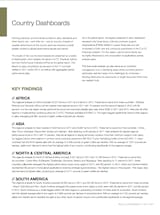
C.A.F.E. Practices: FY11-FY12 Results Assessment Country Dashboards
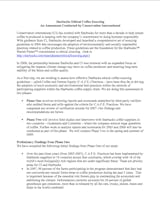
Starbucks Ethical Coffee Sourcing: An Assessment Conducted by Conservation International
Previous Projects

Designing digital traceability to benefit coffee farmers
Conservation International partnered with Starbucks to identify the benefits of digital traceability and determine how best to design such programs.
Our team conducted a series of field visits to interview cooperatives, washing-station managers, farmers and additional key stakeholders.

Establishing a net-positive-impact coffee origin in Oaxaca, Mexico
In September 2016, Conservation International and the Starbucks Foundation joined forces to design and implement net-positive-impact coffee origin demonstration that delivers and quantifies positive outcomes for coffee farmers, communities, and water conservation in Oaxaca, Mexico. The project defines a new model for origin-based investments within the coffee sector. Conservation International is focusing on revitalizing the shade management systems to support productivity as well as wildlife conservation and food and income diversification.
